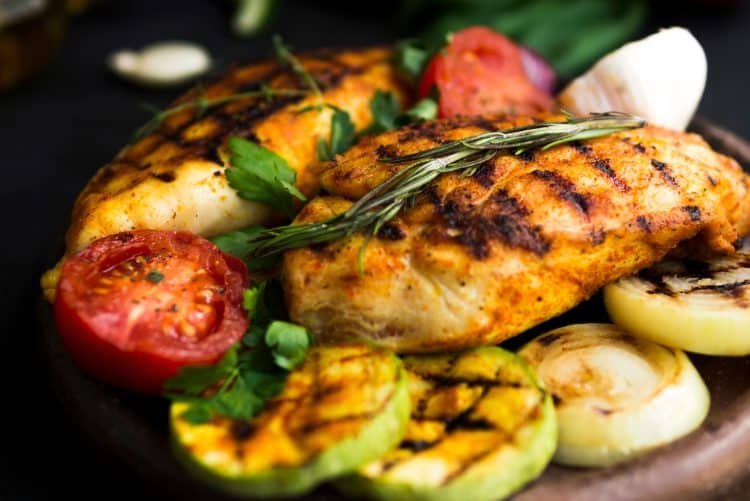Intermittent fasting is popular nowadays, with people adopting this fasting regimen to lose weight and gain other health benefits. However, when it comes to weight loss, no single solution will work for everyone. Intermittent fasting includes alternating between fasting windows and eating windows. During fasting, you must stay away from calories. However, water and other calorie-free drinks are permitted.
Many different intermittent fasting diets exist, like 14/10, OMAD, and alternate-day fasting. One of the easiest and most effective IF plans is the 16/8 diet plan. With the 16/8 intermittent fasting plan, you will be fasting for 16 hours daily and consume all your meals in the remaining eight-hour feeding window.
What you eat in your feeding windows significantly affects your 16/8 fasting plan. This is why you must plan your meals, ensuring your eating is healthy and balanced. This will provide sufficient energy to tide you through the fasting windows and ensure your productivity does not suffer.
What to Eat During 16/8 Intermittent Fasting?
When fasting for 16 hours, drink only water and calorie-free drinks like unsweetened tea and coffee. Ensure you don’t add cream or sugar to the tea or coffee. During your eight-hour feeding window, go for the following foods:
Nutrient-Dense Foods
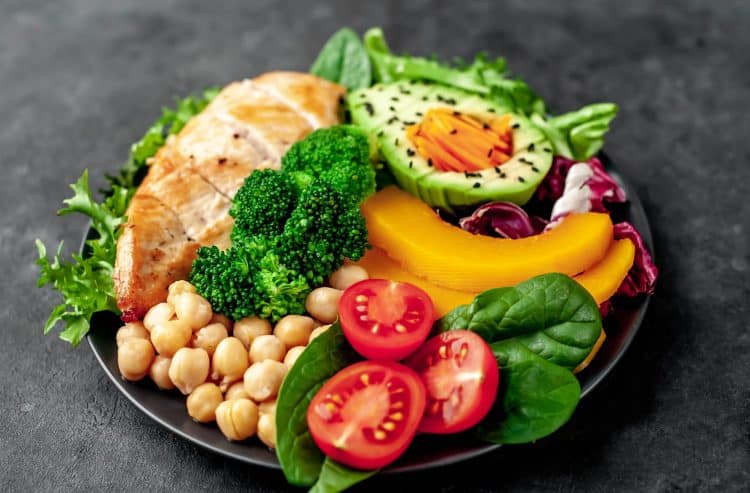
You get minerals, vitamins, and other nutrients essential for your health with nutrient-dense foods. These foods typically contain fewer calories than processed foods.
Examples of nutrient-dense foods include:
Level Up Your Fitness: Join our 💪 strong community in Fitness Volt Newsletter. Get daily inspiration, expert-backed workouts, nutrition tips, the latest in strength sports, and the support you need to reach your goals. Subscribe for free!
- Fruits
- Vegetables
- Fish
- Eggs
- Lean meats
- Legumes and beans
- Seeds and nuts
Healthy Fats

Healthy fats are an essential component of a well-balanced diet. Healthy fats give your body energy to burn during fasting while also helping your body absorb much-needed vitamins. Healthy fats will keep you satiated for longer, which is extremely helpful when your goal is weight loss. [1]
While healthy fats are beneficial, be careful not to consume too much as they are calorie dense and may contribute to weight gain.
Examples of healthy fats are:
- Nuts and seeds
- Avocados
- Oily fish
- Olive oil
- Eggs
Fiber-Rich Foods
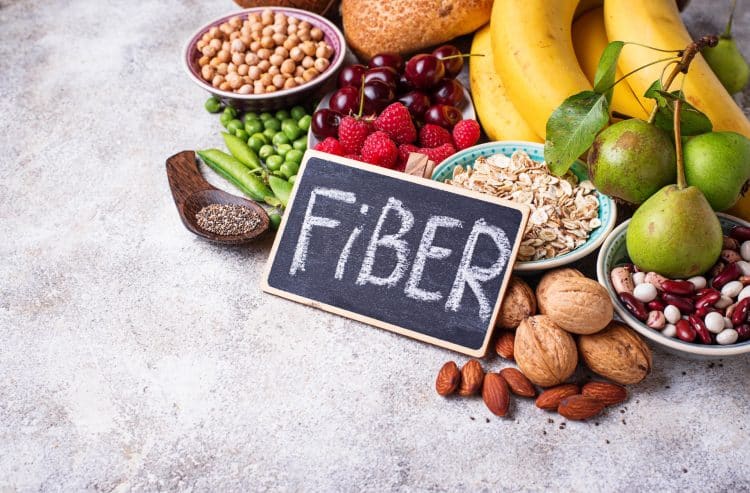
Fiber is one type of carb that our body cannot digest. Fiber will pass through your digestive system in an undigested form and keeps you feeling full for a long time. With constipation being one significant side effect of fasting, the fiber in the right amounts will negate it.
Foods high in fiber include the following:
- Fruits
- Vegetables
- Legumes and beans
- Whole grains
- Nuts and seeds
Protein-Dense Foods
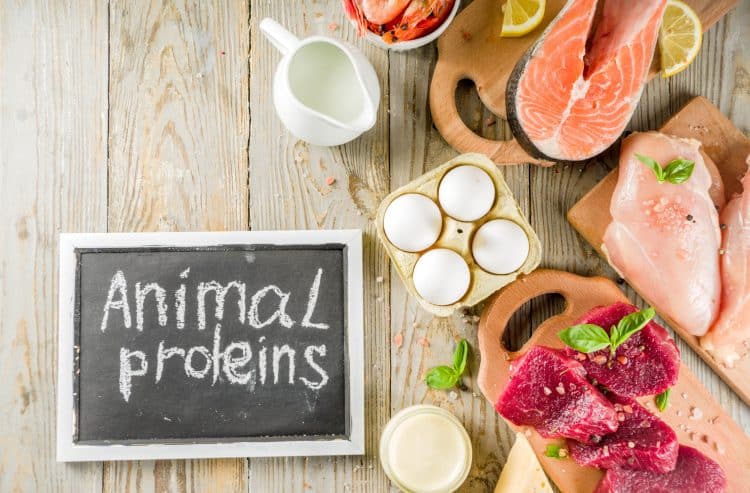
Protein is a vital component in weight loss. It helps you maintain and build muscle mass, which in turn assists you in burning more calories. Protein will also keep you satisfied and full for a long time after your meal.
Here are some examples of protein-rich foods:
- Eggs
- Fish
- Lean meat and poultry meat
- Legumes and beans
- Seeds and nuts
7-Day Meal Plan For 16/8 Intermittent Fasting
This meal plan will help you get started with 16/8 intermittent fasting. It has a wide variety of foods that are dense in nutrients and will provide sufficient energy to function optimally throughout the day. Remember to have two meals at least during your eight-hour feeding window, along with snacks between meals if needed. Also, ensure that you drink 2-3 liters of water daily.
Day 1
- Break your fast with Greek yogurt along with chia seeds
- Meal 1: Grilled chicken with salad
- Meal 2: Roasted vegetables with salmon
- Snack (if needed): A hard-boiled egg or a handful of nuts
Day 2
- Break your fast with a green smoothie
- Meal 1: Omlete with vegetables
- Meal 2: Chicken with quinoa salad
- Snack (if needed): Apple along with almond butter
Day 3
- Break your fast with Chia pudding
- Meal 1: Turkey with avocado wrap
- Meal 2: Ground turkey with marinara sauce and spaghetti sauce
- Snacks (if needed): Slices of cucumber with hummus
Day 4
- Break your fast with fruits and a bowl of yogurt
- Meal 1: Barley and vegetable soup
- Meal 2: Grilled chicken along with roasted potatoes
- Snacks (if needed): A boiled egg
Day 5
- Break your fast with a smoothie
- Meal 1: Whole wheat bread and egg salad
- Meal 2: Zucchini noodles with sauteed shrimp
- Snacks (if needed): Carrot sticks along with guacamole
Day 6
- Break your fast with berries and yogurt
- Meal 1: A bowl of quinoa and avocado, black beans, and salsa
- Meal 2: Roasted brussels sprouts with grilled salmon
- Snacks (if needed): A hard-boiled egg
Day 7
- Break your fast with a bowl of yogurt and fruits
- Meal 1: Salmon poke bowl
- Meal 2: Vegetable and chicken stir fry
- Snacks (if needed): Celery sticks with some peanut butter
7-Day Meal Plan For Vegetarians Following 16/8 Intermittent Fasting
If you are a vegetarian and want to reap the rewards of 16/8 intermittent fasting, here’s a seven-day meal plan. Remember that choosing the right meals is essential to getting all the required nutrients into your system.
Day 1
- Break your fast with overnight-soaked oats and chia seeds
- Meal 1: Lentil soup
- Meal 2: Vegetable wrap with hummus
- Snacks (if needed): Carrot sticks with peanut butter
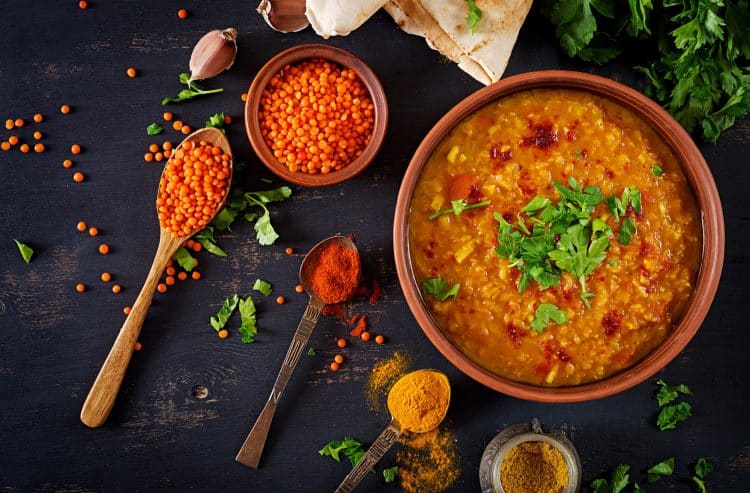
Day 2
- Break your fast with a green smoothie
- Meal 1: Eggplant parmesan
- Meal 2: Roasted vegetables along with a bowl of quinoa
- Snacks (if needed): Grapes
Day 3
- Break your fast with almond butter and bananas
- Meal 1: Roasted vegetables and grilled tofu
- Meal 2: Spaghetti squash with marinara sauce
- Snacks (if needed): Berries and plant-based yogurt
Day 4
- Break your fast with chia pudding
- Meal 1: Minestrone soup
- Meal 2: Roasted sweet potatoes and grilled portobello mushrooms
- Snacks (if needed): Apples
Day 5
- Break your fast with a smoothie
- Meal 1: White bean salad
- Meal 2: Zucchini noodles and sauteed vegetables
- Snacks( if needed): Celery sticks with peanut butter
Day 6
- Break your fast with berries and a plant-based yogurt bowl
- Meal 1: Black bean burger
- Meal 2: Lentils with roasted cauliflowers
- Snacks (if needed): Whole wheat crackers with guacamole
Day 7
- Break your fast with a bowl of yogurt and fruits
- Meal 1: Vegetable stir fry
- Meal 2: Black bean enchiladas and sweet potato
- Snacks (if needed): Grapefruit
Advantages of 16/8 Intermittent Fasting
Here are the benefits you can accrue from following a 16/8 intermittent fasting regime:
Level Up Your Fitness: Join our 💪 strong community in Fitness Volt Newsletter. Get daily inspiration, expert-backed workouts, nutrition tips, the latest in strength sports, and the support you need to reach your goals. Subscribe for free!
Implementation Ease
If you are new to intermittent fasting, you will have the most success with 16/8 IF because it is the easiest to follow. All you have to do is restrict your eating to eight hours and fast for the remaining 16 hours. It will be even easier if you schedule your fast during the night, as you will be sleeping for most of the fasting hours.
Weight Loss
You will see long-term weight loss if you practice 16/8 IF on a consistent and dedicated basis. This is because of the reduction in your overall calorie intake. [2]

Increased Energy Levels
16/8 Intermittent fasting can help boost your energy levels. This may be because when you fast, your body can utilize stored energy reserves better.
Better Brain Function
It has also been suggested that 16/8 intermittent fasting can improve brain function. Animal studies have found fasting to be beneficial for the brain. However, human trials have yet to be done. We know that with fasting, the levels of the BDNF hormone in the brain increase, inducing the growth and regeneration of new nerve cells.
Reduced Inflammation
Intermittent fasting can help reduce inflammation. With alternate-day fasting, losing weight decreased inflammation in overweight people with asthma. Inflammation is associated with chronic diseases like high blood pressure and high blood sugar. Practicing 16/8 IF will help you manage such conditions effectively. [3]
Improvement in Heart Health
If you follow 16/8 intermittent fasting, your heart health may also improve. This is possible because losing weight through IF can improve your blood pressure and other markers associated with heart health. [4]
However, if you are taking blood pressure medication, you should consult your doctor before starting 16/8 intermittent fasting.
Better Blood Sugar Control
By following 16/8 intermittent fasting, you may also get a handle on your blood sugar levels. This happens because, with weight loss, insulin sensitivity improves in those with insulin resistance. Again, if you are taking blood sugar medications, consult a doctor before starting the 16/8 IF diet plan.
Tips For Successful Implementation of 16/8 Intermittent Fasting
Use these tips for overall success with the 18/8 IF diet regime:
Go for a Convenient Eating Window
When you eat at the right time, it ensures that there is a steady supply of energy for you to draw upon for optimal performance. Ensure that your eating window suits your work hours and overall lifestyle. If you are a busy working professional, you may choose to eat at a time that coincides with the end of your work day. This will ensure that you can eat without feeling rushed.
Eat For Satiety
When you follow a 16/8 Intermittent fasting plan, do not reduce your calorie intake too much. This will lead to hunger pangs, making sticking to your fasting schedule challenging. Instead, you should eat to satiate yourself and ensure that you include nutrient-rich food.
Give Priority to Food Quality
You cannot have unhealthy and processed food just because you are fasting. When you eat, ensure you eat whole, nutrient-dense food. It is okay to indulge occasionally, but please do not make it a habit, or else the entire point of 16/8 fasting is defeated.
Talk To Your Doctor Before Starting
Always make it a point to talk with your doctor to see if intermittent fasting is good for you. Pre-existing conditions may throw a spanner in the works and make you ill when you do 16/8 fasting.
Frequently Asked Questions
1. How often can you eat during 16/8 intermittent fasting?
During the eight-hour feeding window, you can eat whenever you want. You are not limited to 2-3 or any arbitrary number of eating times.
2. What is the best time to do 16/8 intermittent fasting?
All you have to do is allocate a 16-hour window during the day when you will not eat any calories. A good time to schedule it is from 8 pm to 12 pm the following day. If you design it this way, you will be asleep most of the fasting time and find it easier to stick to the fast.
3. How do you know if 16/8 intermittent fasting is working?
You will know 16/8 IF works when you feel no hunger, your body fat percentage goes down, you have less bloating and better bowel movements, increased energy levels, and decreased sugar cravings.
Conclusion
16/8 intermittent fasting includes fasting for 16 hours daily and eating in the remaining eight-hour window. This fasting has many benefits, including increased energy levels, weight loss, reduced inflammation, and improved heart health. When breaking your fast, ensure you have nutrient-dense foods that will satiate and keep you going. Follow our seven-day IF meal plan to see improved health parameters.
References
- Liu, Ann G., et al. “A Healthy Approach to Dietary Fats: Understanding the Science and Taking Action to Reduce Consumer Confusion.” PubMed Central (PMC), 30 Aug. 2017.
- Collier, Roger. “Intermittent Fasting: The Science of Going Without.” PubMed Central (PMC).
- Alam, Iftikhar, et al. “Recurrent Circadian Fasting (RCF) Improves Blood Pressure, Biomarkers of Cardiometabolic Risk and Regulates Inflammation in Men.” PubMed Central (PMC), 19 Aug. 2019.
- Mani, Kartik, et al. “Lysosomes Mediate Benefits of Intermittent Fasting in Cardiometabolic Disease: The Janitor Is the Undercover Boss.” PubMed Central (PMC), 14 Sept. 2018.

